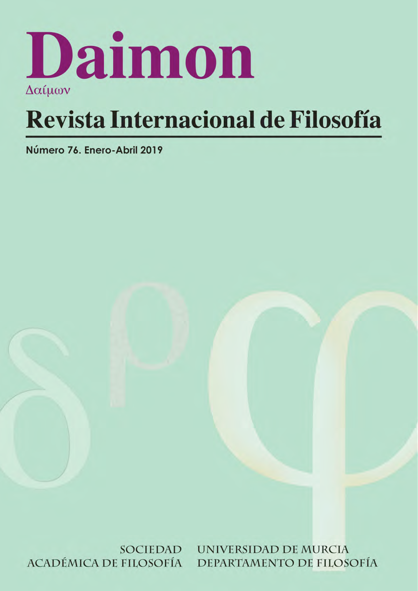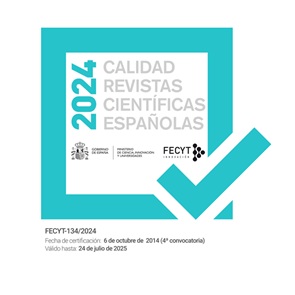Prácticas clasificatorias desde la filosofía de la ciencia: entre metafísica y epistemología
Agencias de apoyo
- Este trabajo se incluye dentro de una investigación financiada por una beca predoctoral de la UPV/EHU (programa de ayudas FPI-2010) y un proyecto de investigación (MEC ref. FFI2011-25665) financiado por el Gobierno de España. Deseo asimismo expresar mi ag
Resumen
T. Reydon (2010) analiza el debate actual sobre los géneros naturales e identifica dos corrientes –denominadas “aproximación metafísica” y “aproximación epistemológica”– que interpretan y abordan un mismo problema de manera distinta. Después de examinar de forma crítica algunos aspectos problemáticos de la propuesta de Reydon se presenta un análisis alternativo, en donde se recogen y desarrollan aspectos de su propuesta introduciendo nuevos elementos a fin de salvar sus limitaciones. Defendemos que entender la discusión filosófica sobre los géneros naturales en los términos de este nuevo análisis facilita la comprensión y caracterización de muchos de sus aspectos más controvertidos.
Descargas
-
Resumen973
-
pdf1454
Citas
Bird, A. “The Metaphysics of Natural Kinds”, recuperado de http://eis.bris.ac.uk/~plajb/research/inprogress/Metaphysics_Natural_Kinds.pdf.
Bird, (2010), «A Posteriori Knowledge of Natural Kind Essences: A Defense», Philosophical Topics, Vol. 35, pp. 293-312.
Bird, (2010), «Discovering the Essences of Natural Kinds», en H. Beebee, and N. Sabbarton-Leary (eds.), The Semantics and Metaphysics of Natural Kinds, Routledge, pp. 125-136.
Borghini, A., y Casetta, E. (2012), «Quel che resta dei generi naturali», Rivista di estetica, Vol. 49, pp. 247-273.
Boyd, R.N. (1999), «Kinds, Complexity and Multiple Realization», Philosophical Studies, 95, pp. 67–98.
Boyd, (1991), «Realism, anti-foundationalism and the enthusiasm for natural kinds», Philosophical Studies, 61, pp. 127–148.
Boyd, (1999), «Homeostasis, Species, and Higher Taxa», en R. Wilson (eds.), Species: New Interdisciplinary Essays. Cambridge: MIT Press, pp. 141-185.
Cooper, R. (2005), Classifying madness: A philosophical examination of the diagnostic and statistical manual of mental disorders. Springer,.
Devitt, M. (2008), «Resurrecting Biological Essentialism», Philosophy of Science, 75, nº 3, pp. 344-382.
Dupré, J. (1999), «Are Whales Fish?», in D.L. MEDIN & S. ATRAN, (eds), Folkbiology, MIT Press, pp. 461-476.
Dupré, J. (1993), The Disorder of Things: Metaphysical Foundations of the Disunity of Science. Harvard: Harvard University Press.
Dupré, J. (2002), Humans and Other Animals, Oxford: Oxford University Press.
Ellis, B. D. (2001), Scientific essentialism. Cambridge: Cambridge University Press.
Ellis, B. D. (2009), The Metaphysics of Scientific Realism, Chesham: Acumen.
Garvey, B. (2007), Philosophy of biology. Stocksfield: Acumen.
Goodman, N. (1978), Ways of Worldmaking. Indianapolis: Hackett.
Hacking, I. (1991), «A Tradition of Natural Kinds», Philosophical Studies, Vol. 61, pp. 109–126.
Hacking, I. (2007), «Natural kinds: Rosy Dawn, Scholastic Twilight». Royal Institute of Philosophy Supplement, Vol. 82, nº 61, pp. 203-239.
Keller, R. A., Boyd, R. N., & Wheeler, D. Q. (2003), «The illogical basis of phylogenetic nomenclature». The Botanical Review, Vol. 69, nº 1, 93-110.
Khalidi, M. A. (2013), Natural Categories and Human Kinds. Classification in the Natural and Social Sciences. Cambridge: Cambridge University Press.
Laporte, J. (2004): Natural Kinds and Conceptual Change. Cambridge: Cambridge University Press.
Locke, J. (1975): An Essay Concerning Human Understanding. En Peter H. Nidditch (ed.). New York: Oxford University Press. Traducción de E. O’Gorman. Ensayo sobre el entendimiento humano. México: Fondo de Cultura Económica.
Lowe, E. J. (2006): The Four-Category Ontology: A Metaphysical Foundation for Natural Science, Oxford: Clarendon Press.
Macleod, M. (2010): «The Epistemology-only Approach to Natural Kinds: a Reply to Thomas Reydon», en F. STADLER (ed.) The Present Situation in the Philosophy of Science. The Philosophy of Science in a European Perspective, Vol. 1, pp. 189-194.
Magnus P. D. (2012): Scientific Enquiry and Natural Kinds: From Planets to Mallards, Basingstoke, Hampshire: Palgrave Macmillan.
Mill, J. S. (1884): A System of Logic. London, Longman.
Okasha, S. (2002): «Darwinian Metaphysics: Species and the Question of Essentialism», in Synthese, Vol. 131, pp. 191–213.
Quine, W. O. (1969): Ontological Relativity and Other Essays. New York, Columbia University Press.
Reydon, T. (2010): «Natural Kind Theory as a Tool for Philosophers of Science», en: M. Suárez, M. Dorato, & M. Rédei (eds.), EPSA, Springer, pp. 245-254.
Russell, B. (1948): Human knowledge: its scope and limits. New York, Simon and Schuster.
Slater, M. (2014): «Natural Kindness», The British Journal for The Philosophy of Science, doi: 10.1093/bjps/axt033
Strawson, P. F. (1959): Individuals, London: Methuen, p.169.
Wilson, R. A. (1999): «Realism, essence, and kind: resucitating species essentialism», en Species: New Interdisciplinary Essays, Cambridge: MIT Press, pp. 187-207.
Wilson, R., Barker, M. J., & Brigandt, I. (2007): «When traditional essentialism fails: biological natural kinds», Philosophical Topics, Vol. 35, nº 1, pp. 189-215.
Las obras que se publican en esta revista están sujetas a los siguientes términos:
1. El Servicio de Publicaciones de la Universidad de Murcia (la editorial) conserva los derechos patrimoniales (copyright) de las obras publicadas, y favorece y permite la reutilización de las mismas bajo la licencia de uso indicada en el punto 2.
2. Las obras se publican en la edición electrónica de la revista bajo una licencia Creative Commons Reconocimiento-NoComercial-SinObraDerivada 3.0 España (texto legal). Se pueden copiar, usar, difundir, transmitir y exponer públicamente, siempre que: i) se cite la autoría y la fuente original de su publicación (revista, editorial y URL de la obra); ii) no se usen para fines comerciales; iii) si remezcla, transforma o crea a partir del material, no podrá distribuir el material modificado.
3. Condiciones de auto-archivo. Se permite y se anima a los autores a difundir electrónicamente las versiones pre-print (versión antes de ser evaluada) y/o post-print (versión evaluada y aceptada para su publicación) de sus obras antes de su publicación, ya que favorece su circulación y difusión más temprana y con ello un posible aumento en su citación y alcance entre la comunidad académica. Color RoMEO: verde.











